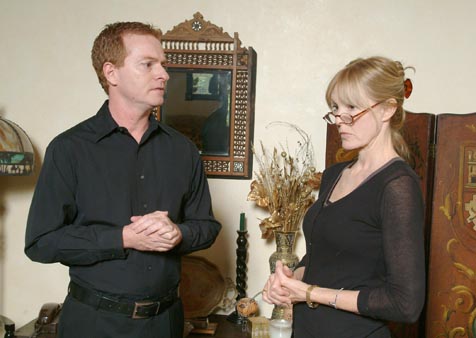Santa Barbara Theatre to Stage Doubt
No Room for Certainty

Take a reform Catholic priest, a teenage boy, and a nun who prides herself on her upstanding moral code. Throw in the suspicion of pedophilia on the part of the priest and watch the whole thing ignite. But don’t be so sure you know where the truth lies. In John Patrick Shanley’s Pulitzer and Tony Award-winning play, doubt is the name of the game.
Doubt opened off-Broadway at the Manhattan Theatre Club in November 2004, moving on to Broadway in 2005 where it remained for 16 months. Even before it had hit Broadway, a production of Doubt at the Pasadena Playhouse had caught the attention of Albert Ihde and Ellen Pasternack of the then newly formed Santa Barbara Theatre. “We were totally enthralled by the script,” Ihde told me over coffee last week. “It lined up perfectly with what we wanted to do: plays that are about something and that are very well-written. We started applying for the rights to it even before they were available.”
Though the play’s setting raises the issue of sexual abuse in the Catholic Church, its deeper themes are philosophical in nature, amounting to a reexamination of such concepts as truth, faith, and morality. Playwright John Patrick Shanley is said to have shared with the director and lead actor of the first production what he believed to be the “truth” of the matter between his characters, but for the rest of the cast, and for the audience, what really unfolds remains a subject for debate. And debate is exactly what SBT’s directors hope their production will inspire; public talkbacks with the actors and the director, Assad Kelada, are scheduled to follow two of the 10 performances at Center Stage Theater.
From the play’s opening line, delivered by Father Flynn, “What do you do when you’re not sure?” Doubt forces its audience to face the discomfort of uncertainty. Apparently, most viewers form an opinion on the play’s events by the time they leave the theater, but where they’ll come down is hard to predict.
“Shanley was caught up with the idea that so many people these days are certain without evidence,” Ihde said. “He wants you to think about the value of doubt in our society; he wants the audience to be unsure.” “Doubt is a parable-a story meant to teach-and it really works,” added Pasternack. “It’s a thriller and a mystery; all you have at the end is your opinion based on what you think you’ve seen.”
Ihde and Pasternack continue to hold conflicting interpretations of the play’s events, while Kelada sidesteps the question altogether. “I want everyone to come to their own conclusions,” he told me over the phone from Los Angeles during a break from rehearsals last week. Like Ihde and Pasternack, Kelada is excited by the play’s intelligence-and by its challenges. “The play is so rich in terms of what it allows us to explore and examine about how we conduct ourselves,” he said. “It’s set in the ’60s, but it deals with things that are very much a part of our lives today. There is so little true discourse these days-people don’t really listen to each other. We don’t want to accept the possibility that there is a grey area, that somebody who does not see things exactly the way we do might not be wrong. Shanley himself has written that people’s usual reaction to doubt is that it suggests weakness; he feels that the ability to entertain doubt is the beginning of growth.”
The Yale-educated director is particularly excited to speak to the audience following the performances. “We don’t exist on the stage without the other side,” he said. “That exchange is very valuable-did we communicate what we set out to communicate? What does this experience create in terms of a continuing dialogue?”
Back on stage with SBT for the first time since starring in Athol Fugard’s Exits and Entrances in 2004 is William Dennis Hurley as Father Flynn. Playing opposite him in the formidable old-school nun role of Sister Aloysius is Victoria Tennant. “A lot of [dramatic] material does not exactly challenge your intellect,” Tennant commented. “This certainly does. It’s like a Shakespeare sonnet: Every line is so jam-packed with meaning, alternative meaning, and secret meaning. As an actor in Doubt, you have to have a point of view-you have to choose what you think has happened.” Like the others, Tennant wouldn’t give her opinion on the play’s events. “I’ve decided that I don’t want to know what Assad and William are planning, because it doesn’t help me,” she said. “I think something my character decides is evil doesn’t even have to happen-the threat and the intent are dangerous enough that I would battle to remove him.” Ultimately, Tennant said, “The question is, ethics at what price? At what point do you recognize that there is a grey area, and following the rules to the letter may not be the best course of action?”
One thing’s for sure: There’s no room for certainty in Doubt.
4•1•1
Doubt runs at Center Stage Theater March 20-30, with talkbacks following the performances on March 25 and 27. For more information, call 963-7282 or visit sbtheatre.org.



